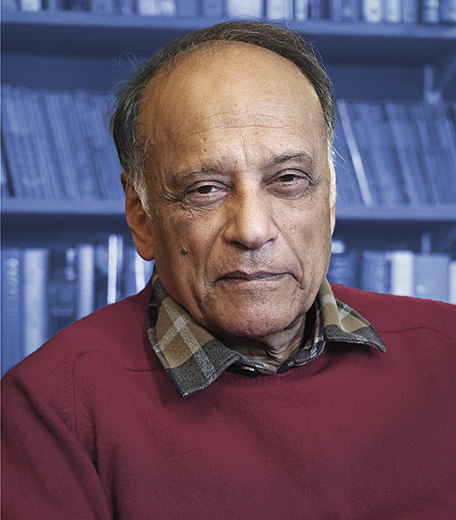Download
Acceptance speech
Partha Dasgupta
Partha Dasgupta (Dhaka, Bangladesh – formerly part of India, 1942) received a BSc in Physics from the University of Delhi (India) in 1962, then went on to complete a BA in Mathematics at the University of Cambridge (United Kingdom). In 1968 he received his PhD in Economics from Cambridge and in the same year joined its Trinity Hall as a research fellow. He is currently Frank Ramsey Professor Emeritus of Economics at this same institution, as well as a Fellow of St John’s College. From 1978 to 1984 he taught economics at the London School of Economics (United Kingdom) and from 1989 to 1992 at Stanford University (United States), where he headed the Ethics in Society program, before returning to Cambridge in 1994. Between 2007 and 2013 he also served as Andrew D. White Professor-at-Large at Cornell University (United States).
A member of the British Academy since 1989 and of the UK’s Royal Society since 2004, Professor Gupta also belongs to the U.S. National Academy of Sciences, American Academy of Arts and Sciences, and the Royal Swedish Academy of Sciences, among others. In 2022, the United Nations named him one of its Champions of the Earth – the first economist to receive this honor, and in 2023 he was appointed a Knight Grand Cross of the Order of the British Empire “for services to economics and the natural environment.”
In his early research in the 1970s, Partha Dasgupta posed the question of whether it was possible to substitute exhaustible, limited resources with other assets. In seeking an answer with co-author Geoffrey Heal in their paper “The Optimal Depletion of Exhaustible Resources,” published in the Review of Economic Studies in 1974, they reached the conclusion that such substitution was not feasible and that an economy must conserve and distribute its natural resources over time, since the capital generated by the exploitation of natural assets could not substitute the depleted stocks – not in accounting terms and far less in material terms.
Dasgupta believes economics has become overreliant on the idea that scarcity can be overcome by substituting goods, a strategy that has worked well in industrial production but hits its limits when processes are tampered with. For him, the concept of a process, or system, is key to measuring wealth and preserving the natural environment, since goods would not exist without processes.
The awardee has stressed that conventional indicators like GDP cannot give the real value of an economy, since they do not take into account changes in wealth over time across all goods and services. Just as companies have balance sheets, as well as profit and loss accounts, Dasgupta maintains that we should also have balance sheets that include the evolution of nature and natural capital, and not just factories, educated people and machines, which are already included in national statistics.
The second reason he gives for rejecting GDP as a valid measure is that it does not reflect capital depreciation (the gross in gross domestic product means depreciation is not subtracted). The result is that the case could arise (and is likely happening right now) where a country reporting high rates of GDP growth is actually eating into nature. Dasgupta sees this as a dangerous shortcoming, especially in the face of climate change, since GDP does not reflect greenhouse gas concentrations in the atmosphere. That is why he suggests that wealth measurements should include nature — that is, the ecosystems being used — as part of that wealth, and advocates for a notion of sustainable development in which this inclusive wealth increases over time, and does not decline.


